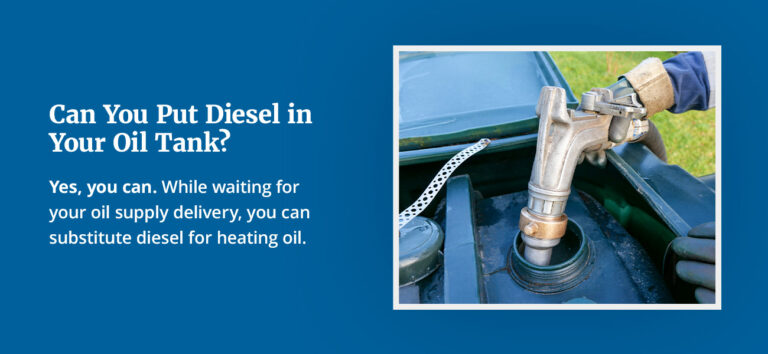Many Pennsylvania households use furnaces to keep warm during colder months. However, you may reach a time when you start running out of heating oil, and your next oil delivery is only in a few days.
If you run out of heating oil, you can use diesel as a short-term solution until you can get more. Learn more about using diesel as a replacement for oil in your furnace below.
Can I Put Diesel Fuel in my Oil Tank?
Yes, you can. While waiting for your oil supply delivery, you can substitute diesel for heating oil. Diesel and heating oil can also be mixed if you’re running low on oil and are worried about running out. Both are midweight distillations of petroleum. Because of this, they burn similarly and can have the same heating effect.
While diesel makes an effective stop-gap when you’re short on heating oil, it should only be used as a short-term solution. Furnaces are made to run on specific oil and are built to accommodate the burning heat, viscosity and other characteristics of heating oil.
Why Shouldn’t I Use Diesel Long-Term?
Diesel burns slightly hotter than heating oil, which can be beneficial for extremely cold nights. However, over time, this additional heat can wear down components at a slightly quicker rate, shortening the lifespan of your furnace.
In addition, diesel is more expensive than heating oil. Most oil tanks are around 275 gallons and hold approximately 225 gallons of fuel, so it’ll take multiple trips to a gas station to get enough diesel to fill up your tank. Using diesel for your furnace will be significantly more expensive than heating oil.
Kerosene is another alternative to heating oil. Like diesel, it should only be used as a short-term solution, as it burns hotter than oil. It also has a lower flashpoint than heating oil, making it easier to catch fire. Always follow the proper safety procedures to prevent accidents.
Please note that you should never use gasoline. It emits flammable fumes and may result in a fire or explosion.
Is Running out of Oil Bad for a Furnace?
The main concern when running out of oil is that your furnace will automatically shut down. Most furnaces have an emergency shut-off that switches off the furnace when oil levels get low. It’s a safety feature that helps protect your furnace from continuing to work without oil, which can cause significant damage.
Running on low or no oil for a short time every so often may not damage your furnace. However, if your furnace runs without oil frequently or for a long time, it can damage the filter, oil pump and oil line. You may also have to bleed the oil line to remove any dirty oil, sediment and air that may cause further damage or blockages.
A technician will have to replace these parts, resulting in extra costs and further delays in getting your furnace working to keep you warm. Additionally, your pipes may freeze if your furnace is off for long enough, leading to blockages and other damage that can be costly to repair.
What to Do if You Run out of Heating Oil
When you notice your oil levels are dropping or your furnace automatically shuts off, remain calm. The first thing you should do is check the thermostat control and ensure your furnace is off. Doing this will ensure you and your home are safe while you continue investigating.
Next, you need to make sure you’re actually out of oil. You can do this by checking the float gauge. If the float moves freely, isn’t visible or sinks to the bottom of the tank you are low on oil or out completely. Once you’re sure you’re out of fuel, you can contact your local heating oil supplier to organize a refill of your tanker.

Can You Use Diesel in a Fuel Oil Furnace in an Emergency?
It happens. Bad weather may prevent oil delivery to your address, or you may run out of oil on a cold night. When an emergency strikes, diesel is chemically similar to home heating oil and can keep your furnace running in a pinch. If you ran out of heating oil and need heat fast, diesel is one of the most common heating oil substitutes.
If you don’t already have diesel on hand, just head to a local gas station with an approved container. Fill up the container with on-road diesel, and carefully pour it into your oil tank.
This can be a real lifesaver, but it’s not a long-term solution. Diesel burns hotter and cleaner than standard heating oil, which can lead to increased wear on your furnace’s components. It’s fine for an emergency, but not for long-term use.
Avoiding Heating Oil Emergencies
By the time you’re wondering what to do if you run out of home heating oil, it may be too late. Instead of researching heating oil substitutes because you ran out of heating oil, it can be useful to have some plans for making sure you don’t run out in the first place. Here’s how:
- Check your tank gauge regularly: Most homeowners don’t realize how quickly oil is used during colder months. Set a weekly reminder on your calendar or phone to keep an eye on your levels so you can place an order before you’re running low.
- Take advantage of Marstellar Oil and Concrete’s online ordering: We make it simple to schedule what you need, when you need it.
- Consider smaller orders: If you wait until your tank is low, any delays or problems can cause you to run out of fuel. At Marstellar Oil and Concrete, we make it easy for customers in Dauphin, southern Snyder, Perry, Cumberland, Juniata, northern York, western Lebanon and western Lancaster County to order as little as 50 gallons.
- Understand when you’re most at risk of running out: You are most likely to run out of oil when there is prolonged bad weather, when prices of heating oil climb and when you’re away or busy for long periods of time. Get into the habit of topping up your heating oil before a trip, when prices are low and before big storms, so you have peace of mind.
- Maintain your furnace: Leaks and inefficiencies can cause you to run low on heating oil. If your furnace is making unusual noises or seems to be going through heating oil faster than usual, call an experienced technician.
We offer fast, reliable heating oil delivery throughout Central Pennsylvania. You can place your order online in minutes, and we’ll usually deliver by the next day.
Need heat now? Our express delivery option gets your fuel to you the same day for just $59. We also accept LIHEAP and offer 50-gallon minimum deliveries, so you’re never stuck without options.
The Difference Between Heating Oil and Diesel
In the past, there might have been variations in BTUs, but heating oil and diesel fuel are essentially the same. However, there are a few differences:
- The dyes: Diesel fuel lacks dye and is taxed for on-road use. Heating oil is dyed red, making it unsuitable for on-road applications and exempt from on-road taxes.
- Price: It’s safe to use diesel fuel in a heating oil system, but it costs roughly $1.00 extra per gallon due to on-road taxes. Diesel and heating oil have different prices due to the way they’re taxed. Heating oil is untaxed, as it’s considered an essential fuel, while diesel has a road tax levied on it. This makes buying diesel at the pumps and getting it delivered more expensive, as the base cost of diesel is higher.
- Delivery: Only a few gas stations may offer heating oil at the pumps, which means heating oil has to be delivered to your house. This additional delivery cost slightly raises the cost of heating oil, but it’s still cheaper than getting diesel delivered.
In addition, the price of heating oil and diesel fluctuates depending on the price of crude oil and the season. As demand for heating increases during winter or cold weather approaches, heating oil costs rise. You can combat this increase by filling your tank a few months in advance.
How to Safely Add Diesel to Your Furnace
Once you’ve confirmed you’re out of heating oil, you can begin the process of adding your heating oil substitute, diesel fuel, into your furnace tank. Here’s how to safely add diesel to your tank:
- Place your order: Order more heating oil as soon as possible.
- Find a fuel container: Depending on how long you need to run the furnace before you get your heating oil, choose to get either 5 or 10 gallons of diesel. If you don’t have any at home, you may be able to buy containers at the gas station. Ensure you use the correct yellow diesel containers to distinguish between the different fuels you have at home.
- Buy your diesel: You can purchase diesel by taking your containers to the gas station.
- Turn off your furnace: You should never fill up your oil tank while your furnace is running.
- Pour in your diesel: Locate your oil tank’s fill pipe and pour in your desired amount of diesel. A good rule is about 5-10 gallons for a day.
- Close your tank fill pipe and wait about 15-20 minutes: This will give the diesel time to settle and allow any sediments to sink back to the bottom. Giving everything time to settle ensures sediment stays out of your fuel pipes and reduces the risk of blockages.
- Turn your furnace back on: The process to restart your furnace may take a few tries, as the diesel may need time to bleed through the lines.
With these steps, your home should be warming up quickly.
Get Fast Heating Oil Deliveries in Central Pennsylvania With Marstellar Oil and Concrete
While you can use diesel or kerosene in an oil furnace in an emergency, they’re not ideal long-term solutions for keeping warm. At Marstellar Oil and Concrete, we provide same-day or next-day deliveries of low quantities of home heating oil, so you always have heat in the winter. Our easy-to-use online heating oil ordering process can save you time and money.
Order heating oil through our website or contact us today!



